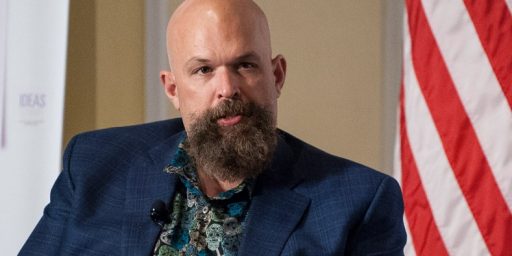America’s Intellectual Crisis
The institutions charged with solving our Information Age social problems are stuck in the Industrial Age.
Walter Russell Mead has proclaimed “The Crisis of the American Intellectual.”
America has everything it needs for success in the twenty-first century with one exception: a critical mass of thinkers, analysts and policy entrepreneurs who can help unleash the creative potential of the American people and build the new government and policy structures that will facilitate a new wave of private-sector led growth.
At first blush, this seems absurd. We’re positively overrun with PhDs, pundits, and think tankers. But he’s not concerned with numbers but direction.
First, there’s ideology. Since the late nineteenth century most intellectuals have identified progress with the advance of the bureaucratic, redistributionist and administrative state. The government, guided by credentialed intellectuals with scientific training and values, would lead society through the economic and political perils of the day. An ever more powerful state would play an ever larger role in achieving ever greater degrees of affluence and stability for the population at large, redistributing wealth to provide basic sustenance and justice to the poor. The social mission of intellectuals was to build political support for the development of the new order, to provide enlightened guidance based on rational and scientific thought to policymakers, to administer the state through a merit based civil service, and to train new generations of managers and administrators.
[…]
The promises of the administrative state can no longer be kept and its premises no longer hold. The bureaucratic state is too inefficient to provide the needed services at a sustainable cost – and bureaucratic, administrative governments are by nature committed to maintain the status quo at a time when change is needed. For America to move forward, power is going to have to shift from bureaucrats to entrepreneurs, from the state to society and from qualified experts and licensed professionals to the population at large.
Well, okay. But we’ve got more libertarian intellectuals than you can shake a stick at. The problem is that American libertarianism is pretty much confined to the intellectual class and has little resonance as a practical political force. Even so, we actually seem to be moving in the direction Mead would wish:
The professional, life-tenured civil service bureaucrat will have a smaller role; more work will be contracted out; much more aggressive efforts will be made to harness the power of information technology to transfer decision making power from the federal to the state and local level.
Mead’s second concern is more interesting:
Second, there are the related questions of interest and class. Most intellectuals today still live in a guild economy. The learned professions – lawyers, doctors, university professors, the clergy of most mainline denominations, and (aspirationally anyway) school teachers and journalists – are organized in modern day versions of the medieval guilds. Membership in the guilds is restricted, and the self-regulated guilds do their best to uphold an ideal of service and fairness and also to defend the economic interests of the members.
[…]
Guild methods are too expensive given society’s rapidly increasing need for the services they provide; we must drastically raise productivity by re-imagining the way our society makes and distributes the services that, currently, the guilds and the learned professions provide. Guilds are not very good at mass production, and our need for the services they produce has become so great that only a much more efficient production process can serve. Health care, education and legal services are all economic sectors where prices have been rising more rapidly than the overall rate of inflation.
This has been a constant refrain of Dave Schuler on OTB Radio, especially with regards to medicine. We’ve certainly restricted the number of medical doctors well beyond any rational basis, such that those with 3.7 grade point averages can’t get into med school.
But we’ve got lawyers and PhDs waiting tables and driving cabs because they can’t find work in the professions for which they’ve trained. And a high percentage of those working in their fields are doing so at very low wages because supply exceeds demand. To the extent prices are out of control in those fields, it’s not guild-inflated salaries causing the problem.
Fortunately for the rest of society if not for the guilds, developments in IT and telecommunications now make it possible to reduce costs dramatically in the learned professions. Outsourcing and automation between them can transform the production and delivery of these services. Moreover, the process of disintermediation will enable many Americans to dispense with the expensive services of the professional classes. Basic legal services and advice can increasingly be found, free or at very low cost, on the internet. Many Americans have substituted tax software for accountants; more and more activities once performed by highly paid professionals will be performed by computers and the internet.
Frankly, there’s no reason for most people to use a highly trained attorney to make out a will or a CPA to do their taxes. Certainly, I used software packages to do my own taxes for years. My wife and I have used an accountant since getting married, but our tax situation is much more complicated than most.
From the standpoint of consumers, this is all well and good. Whether it’s good for society as a whole to rid itself of the need for people making upper middle class salaries is a question for another day.
Third, there’s training. America today has many technical intellectuals – people like doctors, engineers, and others who are able to carry out complex tasks – and we are extraordinarily rich in specialist intellectuals who have a deep knowledge of a particular subject. Our educational and professional systems are set up to train and support the large numbers of people needed to fill these roles. We are much less effective at teaching and supporting people who are able to master the essentials of many complex subjects, integrate the insights from this kind of study into a coherent social or political vision, and communicate what they have learned to a broad general lay audience. The more complex a society and the more rapidly it is changing, the more need it has for multi-disciplinary, synthesizing intellectuals who are focused on communicating serious ideas to a large audience. Otherwise, a gap grows between the technical and specialist intellectuals and the values and ideas of society at large.
Many of us try to do this very thing. But, realistically, the number of people who can simultaneously master the complexities of public policy, engineering, law, and medicine are vanishingly small. And the likelihood of such an individual also being adept at communicating with the public is, well, unlikely. And it’s hard to imagine these Renaissance men lining up for senior fellowships at the Brookings Institution paying $85,000 a year.
There’s another, equally serious problem. In most of our learned professions and knowledge guilds today, promotion is linked to the needs and aspirations of the guild rather than to society at large. Promotion in the academy is almost universally linked to the production of ever more specialized, theory-rich (and, outside the natural sciences, too often application-poor) texts, pulling the discourse in one discipline after another into increasingly self-referential black holes. We suffer from ‘runaway guilds’: costs skyrocket in medicine, the civil service, education and the law in part because the imperatives of the guilds and the interests of their members too often triumph over the needs and interests of the wider society.
Almost everywhere one looks in American intellectual institutions there is a hypertrophy of the theoretical, galloping credentialism and a withering of the real. In literature, critics and theoreticians erect increasingly complex structures of interpretation and reflection – while the general audience for good literature diminishes from year to year. We are moving towards a society in which a tiny but very well credentialed minority obsessively produces arcane and self referential (but carefully peer reviewed) theory about texts that nobody reads. Political science is becoming more mathematical and dogmatic – while fewer and fewer Americans understand the political foundations and ideas behind American institutions.
I don’t disagree; indeed, I’ve been complaining about this for years. The Dan Drezners of the world, who demonstrate interest in wide-ranging subjects and their public policy implications, are considered dilettantes and denied tenure at elite universities. (Although, happily, sometimes scooped up and made full professors at public policy schools.) I would dearly love to see academics encouraged to be public intellectuals rather than writing for the seventeen other academics interested in their micro-niche.
Then again, without somebody doing the latter, the value of the former soon becomes stale. Somebody has to advance the substantive knowledge of the field and, increasingly, that means doing arcane statistical analyses that the average person — indeed, the average social science PhD — won’t be able to fully understand.
The good news is that the talents and personality types necessary for advancing the micro-knowledge in a field and popularizing those findings to mass audiences seldom overlap. So, we need both types and both activities to be rewarded. The bad news is that, as Mead suggests, the guilds are likely to much more highly value the former and thus force most everyone to pursue that and fail. I can conceive of ways to fix this — such as taking tenure and promotion decisions away from academic departments and giving them to more representative intellectual bodies — but they all have pitfalls.
While I’ve generously excerpted, there’s much more to Mead’s essay and I commend it to you in full. While he overstates some of the problems and understates the degree to which some of his desired changes are already underway, I think his fundamental point — that our institutions are changing too slowly to accommodate the realities with which they’re faced — is spot on. Our government bureaucracies, health care system, and educational model are woefully outdated and increasingly unaffordable.







The problem is that Mead exemplifies the problem with American Intellectuals: he wrote several very inaccurate articles about Brazil using English Language sources because he can´t read Portuguese(A readable language for someone fluent in Spanish) or Spanish.
And the problem is that doctors are one thing, “intellectuals” are another. I do agree that the AMA cartel is a crime against America, but the quality of the intellectuals of the Cato Institute or the Brookings Institution have nothing to do with that.
I read his piece and was struck by his apparent lack of awareness of the effect of the New Media on the decline of the public intellectual. His one reference to media was this:
Well, OK, as you would say. But the kind of public intellectual he thinks we need–Walter Lippmann comes to mind–was only possible, I’d argue, in an era when the principal organs of media, all print, were much less diversified than they are today — and because of that lack of diversification, Lippmann could command a much more diversified audience. Mead himself might be the closest thing to what he thinks we need. But how many read The American Interest? The Meads and the Drezners and the Joyners are embedded in this, increasingly dominant, cacophony of online media. And the readers are able more and more to go to those places where their prejudices are reinforced rather than challenged. Hard to see someone with the influence of Walter Lippmann in this stew.
These are not unrelated. Physicians, lawyers, and PhDs are drawn from essentially the same pool of talent in the country. Capping the number of physicians so far below the level per 100,000 population that they are now relative to, say, 1960 results in lots of people who are perfectly capable of doing the work of physicians going into other fields.
Ironically, in 1960 a study by the AMA determined that the number of physicians was too low to serve the population then.
However, that’s not the extent of the problem. Law is a “log normal” field; medicine is not. The lawyers who derive large incomes from the practice of law are most frequently graduates of the top 15 law schools; where you went to to school in the practice of medicine is less important (although not completely unimportant, as you’ve pointed out).
The top 15 law schools haven’t increased their enrollments as fast as the population has grown, either.
I think Mead has misdiagnosed the problem. America has an amazing pool of talented and creative people(*). They just don’t go into political science, let alone politics. In our country they go into tech.
On of course our policy is driven by the sort of folks who do go to politics, having brought with them an entirely different “skill set.”
* – the most amazing recent example was the explosion of (quasi-legal) creativity following the release of Microsoft’s Kinect. It’s officially an input device for the Xbox, but within days of its release people broke its code and started doing things like gesture-painting. It has evolved to, would you believe:
http://kinecthacks.net/
BTW, Kinect Invisibility is a very funny hack.
“Well, okay. But we’ve got more libertarian intellectuals than you can shake a stick at. The problem is that American libertarianism is pretty much confined to the intellectual class ”
With the exception of Nick Gillespie I guess.
Mead is incorrect about the ideology part. America has become more of a center-right country. People are not waiting for government to create jobs.Industry was more tightly regulated in the 40s and 50s. Yes, we are having an innovation deficit. I dont know why. I would speculate that having so many of our best and brightest go into finance and law is part of the problem.
He is correct that we do have problems with education and health care. I think that our education model will need to change a lot, especially for workers later in life. People will need to retrain more frequently.
On health care, our whole system is broken. I dont think you can isolate one piece and fix it. Would more docs help? Maybe, but there is data which suggests it will drive up costs. OTOH, I am currently looking for two new docs and have received a steady stream of CVs from people trained overseas. I think that we are getting a pretty good supply from abroad. We should increase our own numbers, but we are up against a few problems. First, no one wants to pay for medical education anymore. Next, when the economy is good, not so many American grads want to go. They dont want to work nights, weekends and holidays. They want to work in finance, have nice lunches and a shot at the big bucks. Lastly, given the costs of undergrad and med school, plus giving up so much time in training, people want a decent ROI.
Steve
How long have Popular Science and Popular Mechanics been in publication?
They had a lull, but it was only when a new generation switched subscriptions to Byte (or Dr. Dobbs).
This is a country where we’ve long started companies in garages, while politicians did their thing.
You know, those of you above (inc. James in the original) who talked about “public intellectuals” picked up on what’s odd about the Mead piece. He doesn’t use the phrase, though they are obviously his focus, sort of. He conflates the two types, talking about “the learned professions” as if they must be not just intellectuals, but public ones.
When I’m talking about Kinect or garage startups I’m talking about intellectuals in the forest understory.
I think JP’s right that the best and brightest aren’t necessarily going into the guilds, they’re going into tech. (And I would add entertainment which is increasingly allied to tech.) They don’t want to be at Brookings when they grow up, they want to be at the MeMeMe company, the one they founded with money from their mom’s credit cards.
There are gifted people who crave security and stability as core needs. They’ll try to enter academia or law or medicine. And there are gifted people who crave independence and freedom. It’s personality driven, but it’s also fed by economic reality: you can make a very good living in the law, but in tech or entertainment you can make the kind of money that buys you a 100 ft. yacht and the crew to sail it.
I don’t think this was always the case. I’m not sure that a century ago there was quite the allure of non-guild intellectual pursuits. (Subject to correction, because I’m shaky on that assumption.) But if you start with a world in which a bright person has no really strong alternative to the guilds, and evolve into a world where those who are both bright and bold find an alternative, you won’t see an IQ drop in the guilds, but you will see originality and boldness drained away.
Andre Kenji: I do agree that the AMA cartel is a crime against America,
This is kind of a pet peeve of mine. The AMA is not responsible for the current doctor shortage. They do not determine the number of medical schools, residency slots*, or foreign doctors approved to come here. Get rid of the AMA tomorrow and these problems will persist. (* – They are one of five groups that vote on this… but only one).
This isn’t to say that there isn’t a medical cartel, because there is, but it’s a heck of a lot more complicated than the AMA. Also worthy of note, a lot of doctors (including my wife) dislike the AMA immensely. They are a “guild” that includes a comparatively small percentage of doctors (and play favorites in terms of specialties).
Dave Schuler: These are not unrelated. Physicians, lawyers, and PhDs are drawn from essentially the same pool of talent in the country.
I’m not sure how true this is, actually. Anecdotally, anyway, it doesn’t seem to work that way. I married into a family with lots of doctors and lawyers. They’re really something of a different breed. My wife is a doctor, and most of the doctors we’ve known (where it’s come up) had some sort of technical field, like engineering, as their backup plan. Her family get-togethers seem to generally involve the lawyers and PhDs on one side of the room and the doctors and engineers on the other side.
>”Her family get-togethers seem to generally involve the lawyers and PhDs on one side of the room and the doctors and engineers on the other side.”
Sounds interesting… do they ever argue across the room?
Well, everyone’s cordial as long as politics doesn’t come up, but there’s definitely two distinct groups and as a pretty universal thing we like to spend time around people who think like us. Could be that the differences emerged as a result of career choice, but it really looks to me to be the other way around. You kinda know which whey they lean when they’re teenagers, and sure enough that’s where they end up.
I have a different take on things. My own feeling is that the continued health of our economy depends on our strength in science, both pure and applied, and the portents are ominous. I am retired after spending my working life as an academic at a major research university. The graduate student bodies in physics, chemistry, and the various engineering departments at my university is largely Asian. Its been like that for a generation or so. What’s new is that more and more of these students are going back to their homelands. The Chinese economy isn’t a basket case anymore, and neither is the Indian economy. South Korea and Singapore continue to do well, as does Taiwan. These countries seem to be able to absorb lots of fresh PhD’s. For some reason, we can’t. University teaching jobs are scarce, and science and educational funding will certainly be cut drastically due to the Republican victories in the Congressional elections and in the various states. So I see things going downhill for us, and it has little to do with our lack of Walter Lippmans. It’s the lack of Richard Feynmans and James Watsons that worries me.
Stan, we were totally nuts when we started requiring foreign post-grads to return home.
We are apparently fixing that bug, but what an incredible lack of understanding, and as you say, at precisely the wrong time.
john p, it’s worse than that. We’re pushing foreign students out, their countries of origin are wooing them, American universities aren’t hiring, our brightest students are choosing careers in finance rather than in science or medicine, and there’s no doubt that the Republicans in the House will cut science funding to the bone. It’s really a grade A disaster.